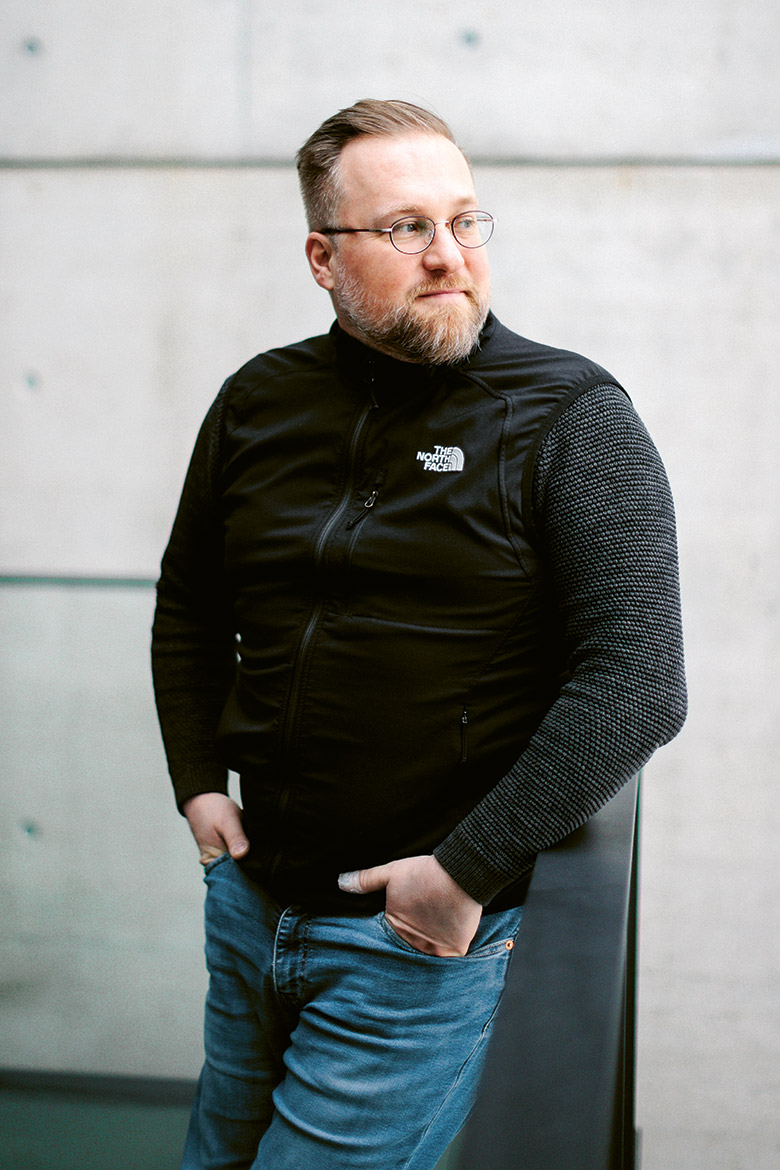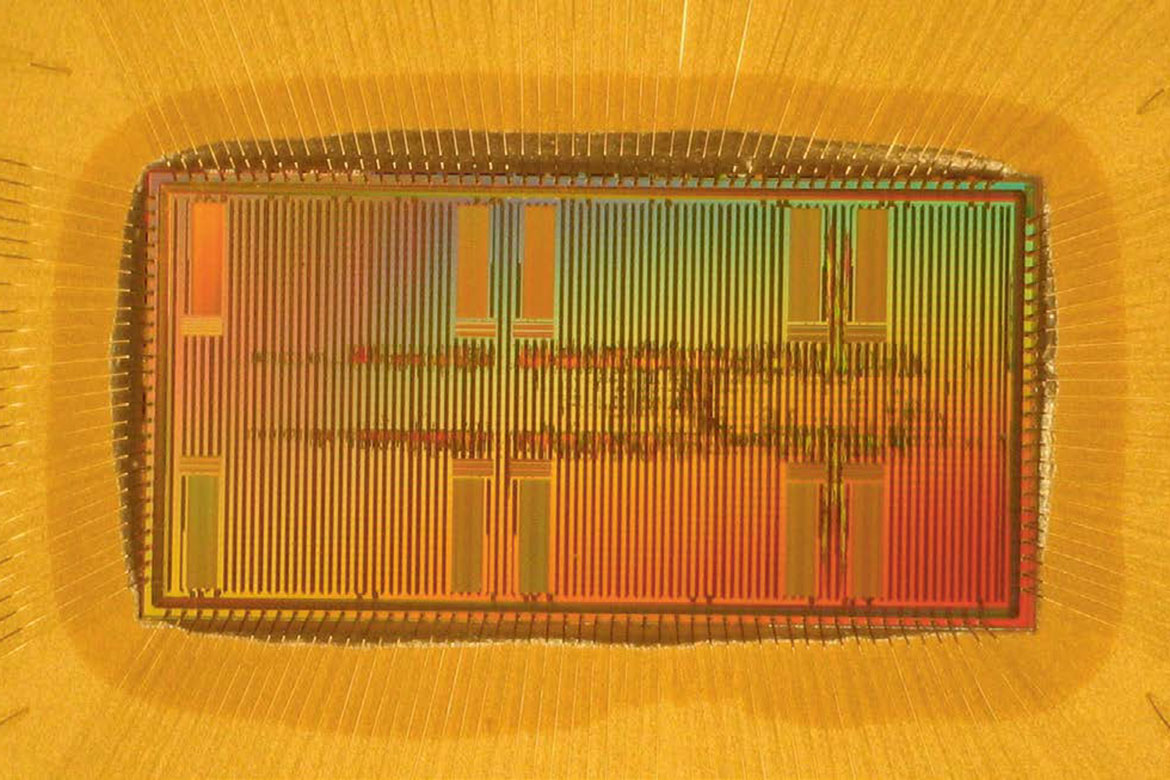Portrait
Fuzzy logic evangelist
Edy Portmann started out as an apprentice electrician only to move onto teaching at university. Today he promotes fuzzy logic, an approach that hopes to restore more humanness to computing. We meet this eclectic and humanist mind who likes to doubt everything, above all himself.

Computer scientist Edy Portmann sees himself more of a skeptic than an expert. | Image: Fabian Hugo / 13Photo
Our meeting is in Olten, at “Switzerland’s most famous” train station restaurant. Edy Portmann, with his sparkling eyes and a wry smile on his lips, does not wait for his green tea to arrive before taking us back more than two thousand years: “What I am trying to do with my research is to extend Aristotle’s point of view”, he says. “He is the father of logic, the grandfather of Boole’s binary algebra that enshrined formal logic, and therefore the great-grandfather of today’s computer science”.
Portmann is a professor of computer science at the University of Fribourg. He says he considers digital technology positively, but immediately points out its limitations: “Binary logic – zero or one, true or false – does not correspond at all to the way we humans work. We don’t think in black and white, but in an infinite number of shades of grey, or even colours”.
The 47-year-old researcher explores ways to integrate subjectivity and ambiguity, characteristic of human beings, into the digital realm. He has become an “evangelist of fuzzy logic”, an approach to computing that bridges the gap between the numerical precision of machines and the qualitative way we express our feelings and thoughts. Fuzzy logic rejects the true-false dichotomy at the core of binary logic and instead uses a continuum of values between these two extremes, allowing it to handle partially true statements.
This approach naturally includes the inevitable uncertainties of the real world and goes beyond simply assigning a probability that something is true or not. “For a thermostat, a room’s temperature is a number, like 19.3 degrees”, he explains.
Subjective algorithms
“But for a human, it’s primarily a subjective sensation, like pleasant or too cold. With fuzzy logic, we can assign a degree of membership to categories defined by humans. A temperature of 19.3 degrees would belong, for example, 60 per cent to the pleasant category, 20 per cent to a bit chilly, 5 per cent to a bit warm, and so on”. This method allows for the integration of subjective impressions and the variability of people into an algorithm.
Portmann applies fuzzy logic to practical problems: lung cancer prediction, social media recommendations, customer service, and even citizen consultations on urban planning. He has also studied delivery route optimisation and the use of the Internet of Things in partnership with the Post Office, which previously funded his chair at the University of Fribourg.
The green tea has arrived and we return to Aristotle. “For him, it was necessary to develop a virtuous character before hoping to achieve happiness, eudaimonia”, the scientist continues. “He emphasised the importance of living well together in community, in the polis, which nowadays refers to the city. This is also one of my research interests: how to use digital technology to support efficient and pleasant cities, the famous smart cities? Here too, it will be crucial to integrate the human aspect better”.
For Portmann, this virtue must also apply to computing: big data offers more precision but threatens privacy by systematically collecting as much private data as possible. “Yet, we can do better with less”, he says. “A postal worker does not need to know that you often leave your house on Mondays at 8:37 am, but only that you are not home on certain mornings. Collecting less data is also necessary to slow down the acceleration of electricity consumption due to big data”.
With his group, he is developing an ethical label for digital applications, a project that once again relies on fuzzy logic: “Moral concepts are expressed in words, not numbers. They vary among people and cultures, and we are looking for ways to include these conversations in technology so that humans and computers can together, in partnership, develop the consensus we need”. A concrete idea pursued by his team is to encrypt how technologically compatible an approach is with different moral values.
From high school to literary punk
The green tea is drunk, and Portmann traces his journey, very atypical for an academic career, from the village in which he grew up, located near Sursee in the canton of Lucerne. “I left high school at 17. At that time, I was learning more from the books I borrowed from the school library than from classes... I was a sort of literary punk who sought intellectual confrontation with adults. When I saw my Latin teacher fail to buy a bus ticket from an automated machine, I told myself it was time to turn the page and focus on tangible matters!”
He then took an apprenticeship as an electrician, worked for a year in a factory, and then opted for a degree in business information technology at the Lucerne University of Applied Sciences and Arts, attracted by the idea of starting a company one day. Three years in the private sector and a master’s degree in economics at the University of Basel followed, driven by the desire to improve his understanding of the context in which the computer science he practised was deployed. He then pursued a PhD at the University of Fribourg, which put him in contact with the great figures of fuzzy logic.
“It is a strength of Switzerland that an apprenticeship can lead to an academic career. It takes a lot of energy and willpower, as well as saving for your studies rather than spending your first pay checks. These experiences accumulated outside of academia are still beneficial to me today: they help me to combine theory and practice, and to talk to people on the ground”.
Portmann could have joined the EPFL and benefited from the reputation and resources of the Swiss Federal Institute of Technology, but he chose Fribourg and its small university: “Its size allows for quick contacts outside of my discipline, whether it’s economists, sociologists or psychologists. A university integrates sociotechnical approaches more naturally than an engineering school, which tends to want to solve problems created by technology through more technology. And the bilingualism of Fribourg appealed to me: I have always been attracted to borders, whether they are between disciplines or cultures. Working with people who speak another language and therefore think differently pushes me to expand my understanding of others”.
The bill is paid, and it is time to say goodbye. The scientist returns to his philosophy: “It’s always doubt that has driven me forward, both in what I read and in what I think and believe I know. I see myself more as a skeptic than as an expert”.




